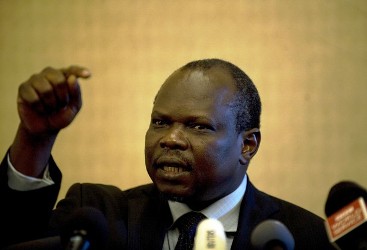S. Sudan’s Supreme Court rejects Pagan Amum petition against Salva Kiir
October 30, 2013 (JUBA) – The Supreme Court of South Sudan has rejected a petition filed in the judiciary organ against the president and chairman of the ruling (SPLM) by the secretary general of the party, saying the latter has not exhausted all other avenues in search of justice.

The SPLM leader formed a committee under the chairmanship of the former speaker of the national parliament, James Wani Igga, who is currently the new vice-president of the republic, to probe into Amum’s conduct.
Amum criticized the formation of the committee, explaining that the decision on his conduct should have been made institutionally in the party’s political bureau or in the national liberation council in accordance with the party constitution and sought justice in the Supreme Court .
However, after two months of scrutiny, the Supreme Court on Monday, 28 October, declared its ruling in rejection of Amum’s petition on the ground that “the petitioner hasn’t exhausted all the remedies available to him.”
Amum’s defence lawyers who presented the petition to the Supreme Court in August said they predicted that the court would rule in favour of the president out of fear, explaining that the behaviour of the court’s president, Chan Reec Madut, on defence lawyers upon receiving the petition was manifesting.
LAWYERS CRITICISE THE SUPREME COURT RULING
The Lawyers for Democracy in South Sudan, an organization founded by South Sudanese lawyers to promote civil rights and the democratic principles in the country, came out with a press release criticising the court’s ruling.
The lawyers said the Supreme Court’s ruling has not critically studied the petition well and has not understood the role of the highest court of the land in protecting the national constitution, particularly in this case involving the president and the secretary general of the ruling party.
“Who is going to protect the Constitution of South Sudan, if the Justices of the Supreme Court don’t understand that there are exceptions to the exhaustion-of-remedies requirement,” partly reads the release.
They alleged that the Supreme Court only acted in fear and could not live to their mandate.
“The Lawyers for Democracy in South Sudan regret that the learned Justices of the Supreme Court dismissed the petition on the ground that the petitioner hasn’t exhausted all the remedies available to him. Where in South Sudan any citizen can appeal against a decision on infringement of Civil Rights taken by President Kiir if not the Supreme Court?, they asked.
President Kiir, they alleged, will continue to violate the constitutions and exercise dictatorship in the new country because the Supreme Court is unable to protect the supreme laws of the land.
“Today’s judgment explains to the people of South Sudan why President Kiir continues to violate the Constitution of South Sudan and Human Rights of its citizens with impunity; why there is no separation of powers in South Sudan,” they further lamented.
The lawyers further argued that there are exceptions in the civil rights action under the bill of rights which necessitated the court to address the concerns raised by the SPLM secretary general.
“As with most legal doctrines, there are exceptions to the exhaustion-of-remedies requirement. A party bringing a Civil Rights action under the Bill of Rights is not required to exhaust any remedies before filing suit in the Supreme Court,” they further explained.
CITIZENS REACT TO THE COURT RULING
Tong Dut, a student in Jonglei state, but currently on a visit to Juba said he was not surprised that the “kangaroo court” would dismiss the petition of the party’s secretary general.
“What other remedies are they talking about as the Supreme Court of the country? The SPLM chairman [Salva Kiir] is refusing to call for the party meeting where such issues can be resolved. Where else can Mr. Pagan Amum go to seek justice?” he asked.
Gatwech Bol, a resident in Juba, urged chairman Kiir to reconcile with his adversaries in the SPLM.
“I am not sure if chairman Salva Kiir will get my statement from the media, but if he gets it I really urge him to reconcile with his colleagues. They criticized him in good faith. There is no democracy without self-criticism and the president should be patient to accommodate such voices that can even bring good change in the party and the country.”
(ST)
